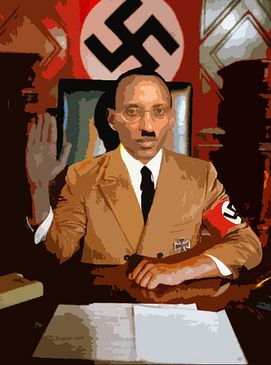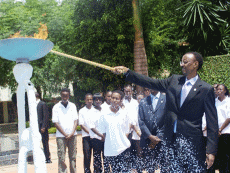by Chief Editor|www.rwandarwabanyarwanda.over-blog.com
Kigali – President Paul Kagame on Wednesday accused foreign critics of trying to impose  values on Rwanda as well as preferring ‘hooligans’ to govern the country – categorically singling-out opposition politician Ms. Victoire Ingabire Umuhoza, RNA reports.
values on Rwanda as well as preferring ‘hooligans’ to govern the country – categorically singling-out opposition politician Ms. Victoire Ingabire Umuhoza, RNA reports.
In a firry 45-minute address to mark the 16th anniversary of the 1994 Tutsi Genocide, Mr. Kagame accused the opposition – specifically naming Ms. Ingabire in person, of “political hooliganism”. The President also accused the critics of “abusing me” in the name of freedom of expression, but said he is “not bothered at all”.
“Some people here want to encouraging political hooliganism,” he said in English, before going into a tirade of attacks on Ingabire, as the crowd behind him was in constant applause.
“Some people just come from nowhere…useless people…I see every time in pictures some lady who had her deputy – a Genocide criminal, talking about ‘there is Genocide but there is another’…that is politics…and the world is also saying ‘the opposition leader’…”
The President was referring to Mr. Joseph Ntawangundi, the aide to Ms. Ingabire who was recently sentenced to 17 years for Genocide.
“They call me Hitler”
In a culmination with loud applause and clapping from the audience, President added: “To that we say a big no. And if anybody wants a fight, then we will give them a fight”.
The President dismissed the notion of free expression as promoted by his foreign critics such as campaign groups, saying Rwandans know what freedom means more than anybody else can teach them. He also attacked those he described as “constantly meddling in our politics” by propagating and making up “lies” about his government.
The President warned his critics of hiding behind freedom of express to “abuse me” but also added that he does not “give a damn”.
“They break tool, they call me Hitler…am not bothered at all…I just hold them in contempt,” he said amid more applause. He wondered how his critics attack him and “at the same time complain about press freedom?”
“You are even free to abuse people, you have no respect for anything…and you turn around to complain that you have no freedom to express yourself? …What more do you want to express about yourself or about others?”
“Ni watu gani awo?”
Mr. Kagame said “bad national politics converged with bad international politics” to cause what was being commemorated at today April 07 for the next three months.
“Who are these giving anyone here lessons honestly? …Ni watu gani awo? …who are these? …are these Rwandans complaining? …or have they sent you to complain on their behalf? …” he wondered in a mixture of English, Kinyarwanda and Swahili, amid applause.
He added: “These Rwandans you see here and elsewhere are as free, as happy [and] as proud of themselves, like they have never been in their lives.”
The President accused the west of preferring to criticize his government but do not want to be held responsible for their role in the Genocide. He also said the west was undermining “our dignity”, “our values” and “our pride”, arguing that democracy took time to get to the current level in their countries.
“They wake up in the morning, distort [the] situation, tell lies about everything…plus they are responsible for many of the things that put here today to commemorate this Genocide…,” he said.
“…yet when they talk about freedom of expression, they don’t want you to express yourself about their responsibility in this Genocide…What freedoms are you teaching me if you cant take responsibility for the politics that killed one million people in Rwanda.”
The Generals
He added: “I know those who say it and support that, know it is wrong. But [it] is an expression of contempt these people have for Rwandans and for Africans…that they think Africans deserve to be led by these hooligans.”
Turning his guns on the government officials who are fleeing the country apparently complaining about “no political space”, the President accused them of “running away from accountability”.
“These Generals fleeing the country should not be taken seriously,” he said, in apparent reference to ex-army chief Gen. Kayumba Nyamwasa, who has political asylum in South Africa.
Earlier, Sports and Culture Minister Joseph Habineza also attacked the man behind the Hollywood movie ‘Hotel Rwanda’. Mr. Habineza did not name Mr. Paul Rusesabagina but was clearly referring to him.
Using poetic speech, the Minister also fired at the vocal opposition causing laughter in the otherwise somber occasion, saying they are blocking the reconciliation among Rwandans.

Paul Kagame lights the flame at the Kigali Genocide Memorial Center
Earlier, in the same stadium amid silence as thousands waited for the arrival of the President, loud cries could be heard from difference sections as survivors erupted in emotional bursts. They continued all through the hours-long function – indicative of survivors remembering their traumatic experiences.
At exactly 12:00, a minute silence was observed in the stadium, as with other areas where commemoration activities were ongoing.
A women survivor narrated how she has rebuilt her life very successfully over the last sixteen years. Her ordeal started on April 07 in Kigali, that by April 12, she could barely move herself as she had been machetted on several parts of her body. The advancing RPF rebels saved her and others on this date – providing all sorts of aid.
As part of the national vigil, local musicians including those from within and outside of Rwanda sung emotional songs composed for the commemoration. White was the top colour they were dressed in – with some combinations of black trousers.
A group of about 200 children – wearing white dresses and purple coverings on their heads delivered a moving presentation in a mixture of English and Kinyarwanda. All through the act coupled with singing, poems and messages of hope for the survivors, traumatic outbursts could be heard as people were driven up by emotion.
Earlier, President Kagame led a brief vigil at the Kigali Genocide Memorial Center where some 250,000 victims are laid to rest. In the courtyard of the Centre, the President lit a flame, which will burn for 100 days in symbolic recognition of the 100 days of the Tutsi slaughter.
Commemorative activities were taking place at village level across the country. In Kigali, city authorities organised a procession from Kacyiru to the national stadium in the afternoon.

